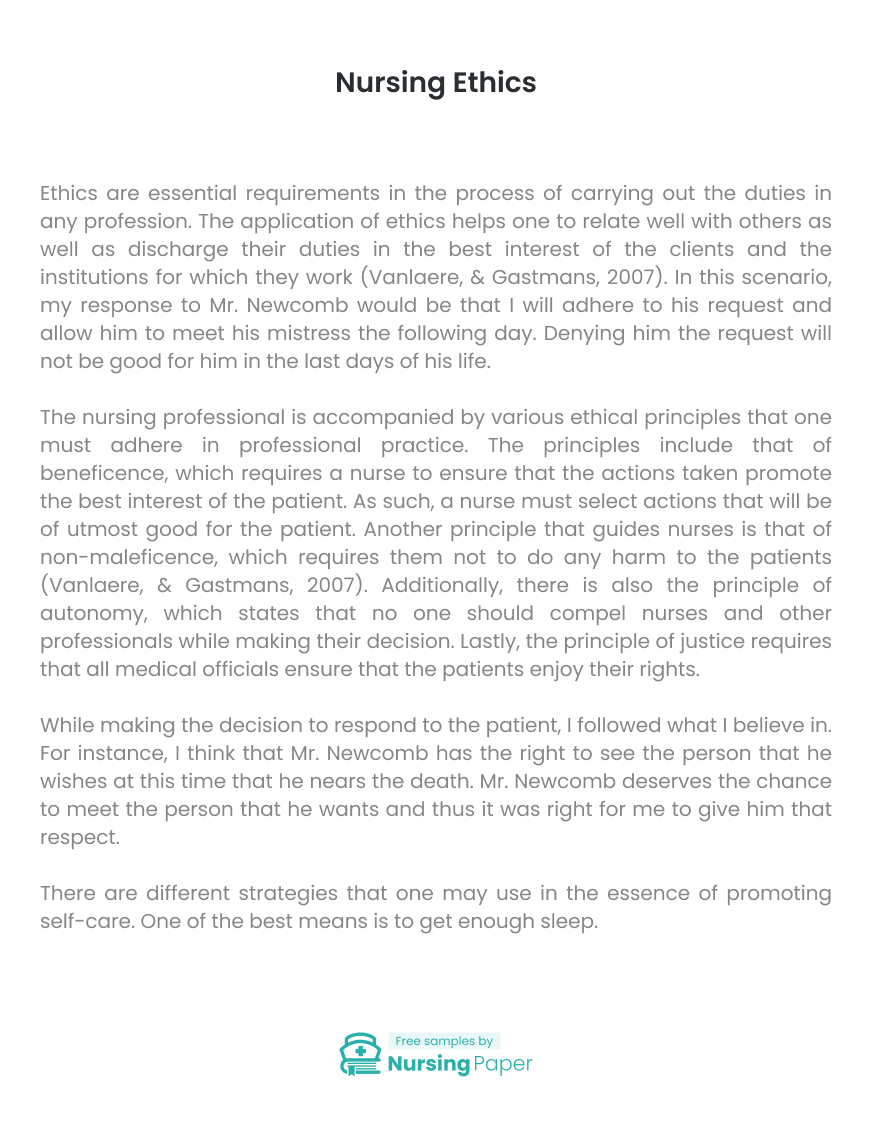
Nursing Ethics
Introduction
Ethics are essential requirements in the process of carrying out the duties in any profession. The application of ethics helps one to relate well with others as well as discharge their duties in the best interest of the clients and the institutions for which they work (Vanlaere, & Gastmans, 2007). In this scenario, my response to Mr. Newcomb would be that I will adhere to his request and allow him to meet his mistress the following day. Denying him the request will not be good for him in the last days of his life.
Main Body
The nursing professional is accompanied by various ethical principles that one must adhere in professional practice. The principles include that of beneficence, which requires a nurse to ensure that the actions taken promote the best interest of the patient. As such, a nurse must select actions that will be of utmost good for the patient. Another principle that guides nurses is that of non-maleficence, which requires them not to do any harm to the patients (Vanlaere, & Gastmans, 2007). Additionally, there is also the principle of autonomy, which states that no one should compel nurses and other professionals while making their decision. Lastly, the principle of justice requires that all medical officials ensure that the patients enjoy their rights.


While making the decision to respond to the patient, I followed what I believe in. For instance, I think that Mr. Newcomb has the right to see the person that he wishes at this time that he nears the death. Mr. Newcomb deserves the chance to meet the person that he wants and thus it was right for me to give him that respect.
Conclusion
There are different strategies that one may use in the essence of promoting self-care. One of the best means is to get enough sleep. Sleep is a vital requirement that helps one to relax and be able to concentrate (Payne, et al 2008). Having a right attitude is another strategy that may help promote self-care in an individual. Finally, carrying out exercise regularly plays a great role in promoting a healthy body in everyone.
1. Payne, S., Seymour, J., & Ingleton, C. (2008). Palliative Care Nursing: Principles And Evidence For Practice: principles and evidence for practice. McGraw-Hill Education (UK).
2. Vanlaere, L., & Gastmans, C. (2007). Ethics in nursing education: learning to reflect on care practices. Nursing Ethics, 14(6), 758-766.



The download will start shortly.

The download will start shortly.
 Subject:
Nursing
Subject:
Nursing  Number of pages: 2
Number of pages: 2  Subject:
Medicine
Subject:
Medicine  Number of pages: 6
Number of pages: 6  Subject:
Health and Social Care
Subject:
Health and Social Care  Number of pages: 7
Number of pages: 7  Subject:
Health and Social Care
Subject:
Health and Social Care  Number of pages: 3
Number of pages: 3  Subject:
Health and Social Care
Subject:
Health and Social Care  Number of pages: 6
Number of pages: 6  Subject:
Medicine
Subject:
Medicine  Number of pages: 6
Number of pages: 6  Subject:
Health and Social Care
Subject:
Health and Social Care  Number of pages: 3
Number of pages: 3  Subject:
Health and Social Care
Subject:
Health and Social Care  Number of pages: 5
Number of pages: 5  Subject:
Health and Social Care
Subject:
Health and Social Care  Number of pages: 4
Number of pages: 4  Subject:
Health and Social Care
Subject:
Health and Social Care  Number of pages: 4
Number of pages: 4  Subject:
Health and Social Care
Subject:
Health and Social Care  Number of pages: 5
Number of pages: 5  Subject:
Health and Social Care
Subject:
Health and Social Care  Number of pages: 3
Number of pages: 3  Subject:
Medicine
Subject:
Medicine  Number of pages: 5
Number of pages: 5  Subject:
Nursing
Subject:
Nursing  Number of pages: 6
Number of pages: 6  Subject:
Medicine
Subject:
Medicine  Number of pages: 4
Number of pages: 4 
